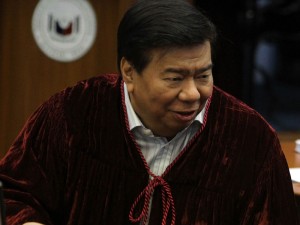MANILA—Officials of the Commission on Elections and the Department of Foreign Affairs have to explain how they spent the combined P148.4 million the two agencies were given for overseas absentee voting since only 15 percent of voters abroad cast their ballots in the last elections.
Senator Franklin Drilon, chair of the Senate committee on finance, said Thursday said he will file the appropriate resolution for a review of the Overseas Absentee Voting Act when the 16th Congress convenes in July.
“Both the Comelec and the DFA… whether in the [deliberations on the] budget or electoral reforms, we would ask them how the budget was spent,” Drilon said at the weekly news forum at the Senate.
His committee on finance and the panel on electoral reforms are expected to conduct hearings on the OAV turnout, which Drilon said was “dismal to say the least.”
“Our estimate is that we spent P1,300 per capita for each vote cast by our overseas Filipinos. I am getting initial reports about the inefficiencies, particularly in the addresses indicated in the voters’ list, and therefore the voting by mail has not been effective and has resulted in just about 15 percent of the registered voters casting their ballots on Election Day,” Drilon told reporters.
Drilon, who shepherded the P2.006-trillion 2013 national budget in the Senate as finance panel chair, said P105.038 million was allocated to the Comelec and P43.41 million was set aside for the OAV in the mid-term elections.
“With only 113,209 overseas Filipinos voting, the cost of each absentee vote is now P1,310 per vote. This is outrageous. I wonder how the Comelec and the DFA can justify these numbers,” Drilon said in a statement earlier.
There are 737,759 registered Filipino voters abroad.
Drilon recalled that he specifically asked DFA officials to increase the participation of Filipinos in absentee voting this year in light of the tightening fiscal position of the government.



